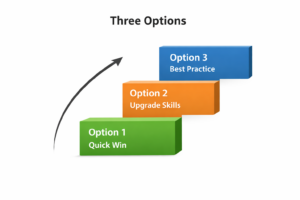Have you ever tried searching Google for chapter and verse on any, even reasonably complicated, subject? How difficult is it to get some definitive information? You have to go from one page that Google has put in front of you, some based on paid aadverts, some based on the page’s SEO ranking, only to find you have to go to 10, 20, 30 pages, then assimilate the information on to one Word document and summarise it. Even then you’re not sure it’s right or complete.
Now imagine stepping into today’s world of digital tools, where we have two distinctly different characters: VAi, the flexible and responsive yoga instructor of the AI world, and Google (and all the other traditioanl search engines), resembling an unfit middle – aged man who’s not seen a gym for over twenty years.
VAi: The Lithe Yoga Instructor
VAi, much like a top-tier yoga instructor, boasts an impressive ability to handle extensive routines. With a generous 4000-character limit for every prompt, whether the initial one or subsequent escalating prompts, VAi is equipped to stretch, bend, and adapt, crafting tailored and detailed responses to youir exact likeing with ease. This vast capacity and flexibility allows for a holistic understanding and nuanced guidance, similar to a yoga guru who seamlessly transitions through complex poses, ensuring every move benefits the whole body.
Google Search: The Out-of-Shape Middle-Aged Man
On the other side, we have Google and all the other old style searches, which, like an unfit middle-aged man, show severe limitations in both memory and flexibility. You see, the old search engines we have all got used to such as Google handle queries one at a time, forgetting previous interactions, much like our couch potato struggling to recall why he walked into the room. This ‘one-search-at-a-time’ approach, with limited scope per query, is outdated and rigid, akin to an old fitness routine that lacks adaptation to current needs. It has no place in a world where obtaining quality support, quickly – especially in a professional or business context – is essential to achieving the efficiency we all crave.
Practical Implications
- Engagement: VAi engages in a dynamic dialogue, understanding and responding to the complexity of each query with the flexibility of a yoga instructor adjusting to the needs of each class. In contrast, Google delivers static, sometimes disjointed results, much like a forgotten gym routine that doesn’t quite hit the mark. You see, Google searches provide ‘Surface-Level Answers’ only which then normally require users to sift through multiple sources for an understanding of the situation – and even then it’s never complete.
- Memory and Context Understanding: VAi’s memory is like muscle memory in an experienced athlete; it retains information from each interaction, enabling increasingly effective responses. Google, however, starts each session without any recall of previous interactions, making it hard to progress or build on past searches. Even then, the results are often based on ads or seo, not on a deep learning or understanding of the subject matter.
- Flexibility in Responses: VAi’s 4000-character limit per prompt allows for expansive, situation specific queries and responses, akin to a yoga session that works every muscle. Google’s limitations resemble a quick stretch – helpful in the moment but far less impactful in the long run.
This playful comparison underscores not only the advanced capabilities of generative AI like VAi when looking for information and support on serious, deep, topics, but also highlights its superiority in providing dynamic, personalised, and context-aware solutions compared to the static, one-size-fits-all approach of traditional search engines, which the user themselves have to try to tailor to something near what the user really needs. Choosing between VAi and traditional search tools is akin to opting for a yoga master over a couch potato for your fitness regime – both might get you moving, but only one truly elevates your performance to new heights.






